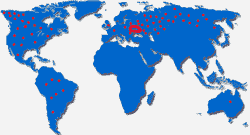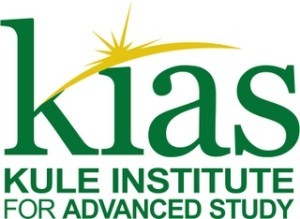Approximately 40 people attended the University of Alberta symposium on Crisis and Identity—Cultural and Linguistic Perspectives on Ukraine and its Diaspora held on March 21, 2017. Organized by Alla Nedashkivska, lead researcher of the Nationalities, Culture and Language Policies Cluster of the Research Initiative on Democratic Reforms in Ukraine (RIDRU), the day offered three sessions with two speakers and one discussant.
In the first session, Marianna Novosolova, Dresden Technical University, offered a detailed analysis of several war poems providing evidence of the distancing of Ukrainian and Russian identities as a result of the war. The audience welcomed future research about the Russian perspective and a comparison between it and that of Ukrainians. Irene Sywenky, University of Alberta, informed us that despite the Chernobyl disaster and its political significance (e.g., resulting in the Green Party) there is little in contemporary Ukrainian literature about the environment, particularly in contrast to the Romantic poets. Discussant Natalia Pylypiuk, University of Alberta, reminded the audience that certain other ecological disasters have not been written about in Ukrainian literature, such as the Soviet destruction of the Dnipro dam in WW2 where 100,000 Soviet citizens and Nazis were killed.
The second session focussed on Ukrainian Canadian folklore. Maryna Chernyavska, University of Alberta, defined and explained many functions of archives as “memory institutions” (i.e., preservation, public access), described source books that exist and pointed out new developments in digital archives. Such archives have the advantage of giving access while simultaneously endangering churches because they can then easily be vandalized. She announced the upcoming conference on Ukrainian Canadian archives in Spring 2018. Natalie Kononenko, University of Alberta, discussed the religious practices of Ukrainian Canadian women, noting that churches in rural Prairie Canada are being cared for disproportionately by women through activities such as cooking for church praznyky (celebrations), quilting to raise funds, and looking after graves. She also described new modifications to cultural practices and noted that she and her team have added 24 new subject headings to describe Ukrainian folklore, and will soon propose them as additions to the Ethnographic Thesaurus of the Library of Congress.
Discussant Jelena Pogosjan, Director of the KULE Folklore Centre, University of Alberta, noted that although the content of folklore is constantly shifting, the purpose of exploring and uncovering the meaning of these ritual shifts remains. Thus, since it is impossible to collect everything, there is a need for an operational model to help researchers collect what is needed to achieve their objectives, as for example determining the role of women.
The final session focussed on questions of language with distinguished scholar Holger Kusse, Dresden Technical University, suggesting linguistic “nation-building”. He drew upon evidence from a range of sources from contemporary Ukrainian to reveal the use of positive language imaging analogous to that used in the 19th century during the period of nation-building.
Alla Nedashkivska, University of Alberta, reviewed multiple internet sources that demonstrate the principle that people themselves are the innovators and language planners in Ukraine. Online sites encourage a variety of language uses, including language switching, remembering old terms, reading for pleasure, adding prestige to Ukrainian, using empowering slogans, replacing foreign words, and using self humour. This data suggests that volunteerism and creativity are key to popularizing Ukrainian language.
Discussant and post-doctoral fellow Ivan Kozachenko, University of Alberta, raised a series of questions for the speakers: Is praise more significant when it comes from people outside the nation? Was language used to manufacture a regional identity in Transcarpathia (e.g., for tourism)? In Donbas, for political reasons? What is the difference in impact between modern social media and the use of radio in the past? Is there a difference between ‘language as identity’ and ‘language as part of an existential choice’? Should analysis of language promotion be situated in its context, i.e., in opposition to, rather than part of, the status quo? Audience discussion was rich for each session, but liveliest in relation to why Ukrainian television is so unengaging. Symposium presentations were videotaped and will be available on RIDRU’s website. Olenka Bilash acknowledged the funders and supporters of the event – Kule Institute for Advanced Study, RIDRU, Department of Modern Languages and Cultural Studies, KULE Folklore Centre, Ukrainian Language Education Centre and the German Academic Exchange Service (DAAD) and the Graduate Academy of Technical University of Dresden – and closed the day with an announcement about RIDRU’s Fall Online Conference: Finding a Way Forward in Ukraine: Reform vs Inertia in Democratizing Government and Society.
PROGRAM
Symposium Chair: Olenka Bilash, University of Alberta
Welcoming remarks
Session I.
Chair: Alla Nedashkivska, University of Alberta
Marianna Novosolova, Dresden Technical University “Contemporary Ukraine from the Poetical Point of View”
Irene Sywenky, University of Alberta “Post-socialist crises through an environmental lens: The case of Ukraine”
Discussant: Natalia Pylypiuk, University of Alberta
Session II
Chair: Olena Sivachenko, University of Alberta
Maryna Chernyavska, University of Alberta “Cultural heritage collections as an expression of Ukrainian Canadian identity”
Natalie Kononenko, University of Alberta “The Religious Practices of Ukrainian Canadian Women”
Discussant: Jelena Pogosjan, University of Alberta
Session III
Chair: Olenka Bilash, University of Alberta
Holger Kusse, Dresden Technical University “The Concept of Language Praising revisited: A Case of Contemporary Ukrainian”
Alla Nedashkivska, University of Alberta “Who is the Language Planner in Contemporary Ukraine?”
Martin Henzelmann, Dresden Technical University “Conflict Interpretation in Ukraine
Discussant: Ivan Kozachenko, University of Alberta







Leave a Reply
You must be logged in to post a comment.